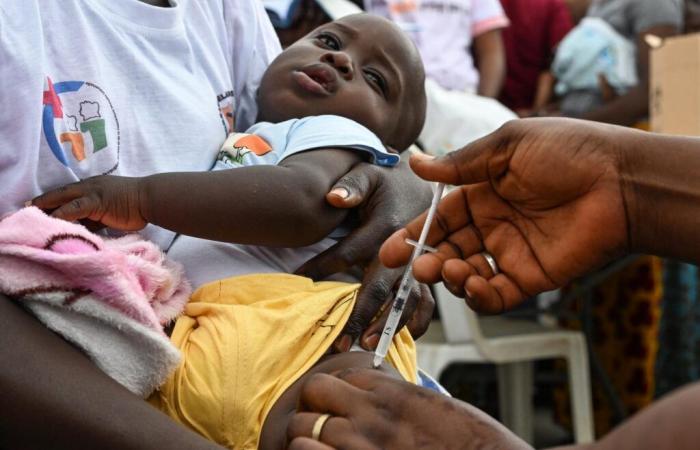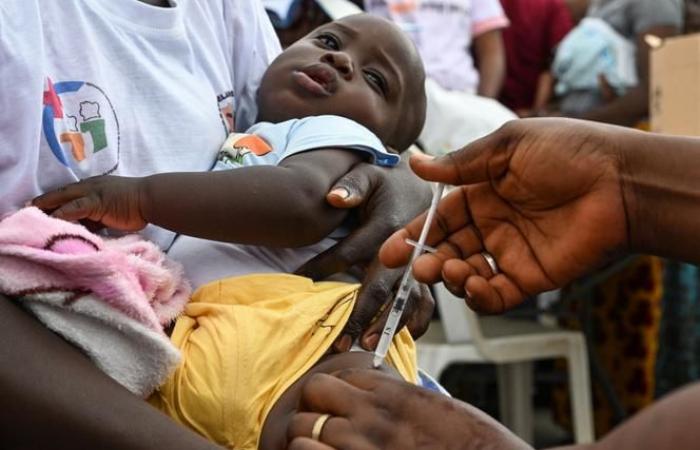In the annals of the fight against malaria in Africa, December 2, 2024 will constitute an important milestone. On that day, Nigeria launched its first ever vaccination campaign against the disease. A notable event in the country most affected in the world by this parasitic infection transmitted by mosquito bite. In 2023, according to the latest figures from the World Health Organization (WHO), 68 million cases were recorded and Nigeria alone recorded 31% of the approximately 600,000 deaths caused by malaria worldwide. worldwide.
Read also | How the DRC is preparing to carry out its first malaria vaccination campaign
Read later
Africa's most populous country relies on one of the two vaccines now recommended by the WHO, R21/Matrix-M, developed by the University of Oxford. The doses are reserved for very young children – the most vulnerable to the disease – in the states of Kebbi (northwest) and Bayelsa (south), two particularly affected regions.
Nigeria thus extends the list of African states having introduced vaccination against malaria in their child immunization program: there are seventeen of them, fourteen of which started in 2024. Eight others should follow in 2025. “There is strong demand from countries to be able to benefit from it”confirms Daniel Ngamije Madandi, director of the WHO global malaria program: « And on the ground, the acceptability of the populations is very high, because parents see on a daily basis how dangerous this disease is for their children. »
Great killer
Even today, a child under 5 years old dies every two minutes from malaria in Africa, a continent which accounts for around 95% of cases and deaths. The response against this great killer constantly comes up against new obstacles: growing resistance to anti-malarial drugs, emergence of a tougher species of mosquito in East Africa, risks of spread linked to climate change… However, there is hope is revived with the deployment of two vaccines acting against Plasmodium falciparum the deadliest malaria parasite in the world – and the one most prevalent in Africa.
The first, RTS,S, recommended by the WHO from 2021, was developed by the British pharmaceutical group GSK. A pilot program between 2019 and 2023, during which it was administered to 2 million children in Kenya, Ghana and Malawi, resulted in a substantial reduction (–22%) in malaria hospitalizations severe. In these three countries, the infant mortality rate from all causes fell by 13%. “These are very significant figures which show how malaria increases the risk for children of dying from another disease”underlines Mary Hamel, responsible for the WHO coordination of malaria vaccination programs.
However, RTS,S has limitations. First, its constrained supply, while GSK has committed to allocating only 18 million doses between 2023 and 2025, far below the needs estimated by the Global Alliance for Vaccines and Immunization (GAVI). And the cost of each dose is more than $10.
Also read (2023) | Fight against malaria: two vaccines that can be a game-changer in Africa
Read later
But the arrival of R21, prequalified by the WHO in October 2023, makes it possible to move on to vaccination on a larger scale. Its designer, the University of Oxford, has entered into a production agreement with the Serum Institute of India, which claims to be able to manufacture 100 million doses per year, all at a significantly lower unit cost (3 .90 dollars). In both cases, four doses are recommended for each vaccinated child.
Stay informed
Follow us on WhatsApp
Receive the essential African news on WhatsApp with the “Monde Afrique” channel
Join
So far, the data does not allow us to say which vaccine offers the best effectiveness or the longest duration. But according to the WHO, when administered in areas of seasonal transmission and combined with preventive treatments, both can reduce malaria cases by 75%. “The vaccine alone is not enoughinsiste Mary Hamel. It can nevertheless be a game-changer provided that there is sufficient funding to ensure its deployment and that of other essential tools such as impregnated mosquito nets. »
“A real turning point”
This is where the problem lies. Purchasing doses on behalf of the poorest countries and organizing vaccination campaigns require significant investments. However, international donors have dedicated 4 billion dollars to the fight against malaria in 2023 (around 3.6 billion euros at the time). That is barely half of the amount deemed necessary each year to implement a real strategy to eradicate the disease.
But for researchers, the context encourages optimism. “For decades, there have been many attempts that have not worked. Now, for the first time, we have vaccines against a human parasite. It’s a real turning point”recalls Professor Umberto d’Alessandro, of the London School of Hygiene & Tropical Medicine. Enough to encourage the scientific community to redouble its efforts to develop new generations of even more efficient vaccines.
Read also | Fight against malaria: new resistance to standard treatments observed in children
Read later
RTS,S and R21 target the parasite as it enters the human body and begins to replicate in liver cells. However, the results of a clinical trial published at the beginning of December in the journal The Lancet reveal that a new vaccine candidate (RH5.1), developed by the University of Oxford and tested in Burkina Faso, offers for the first time effective protection against the blood stage of the disease, i.e. say against parasites that have managed to escape from the liver to enter red blood cells.
“This opens the way to a combined approach between the different vaccines, making it possible to increase their effectiveness”explains Professor Halidou Tinto, from the Health Sciences Research Institute (IRSS) of Burkina Faso, who led the clinical trial and is preparing for the next step: “With all the advances in research, we can really hope that within ten years, malaria will no longer be the leading cause of consultations and deaths in Africa. »







